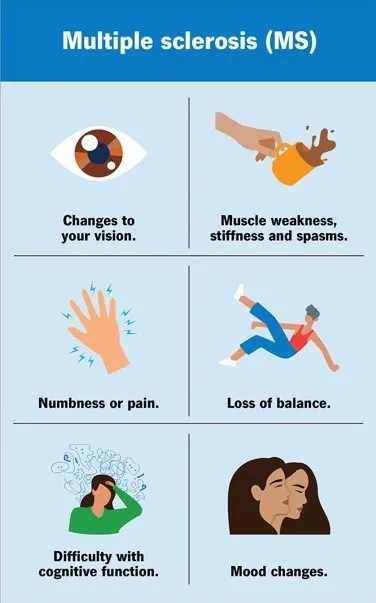Could Multiple Sclerosis Start More Than a Decade Before Symptoms Appear?

Synopsis
Key Takeaways
- MS may start over a decade earlier than previously recognized.
- Early symptoms can include fatigue, headache, and mental health issues.
- Healthcare utilization increases significantly before symptom onset.
- Recognizing MS's prodrome phase could enhance diagnostic processes.
- Most individuals with general symptoms will not develop MS.
New Delhi, Aug 2 (NationPress) Multiple sclerosis (MS) might initiate much earlier than previously assumed. Researchers from Canada have discovered that the initial warning indicators of this immune system disorder could manifest over a decade prior to the emergence of the first classic neurological symptoms.
The results, published in JAMA Network Open, challenge longstanding beliefs regarding the onset of the disease, providing the most thorough view thus far of how patients interact with various healthcare providers in the years before receiving a diagnosis while seeking clarity on vague medical issues.
According to senior author Dr. Helen Tremlett, Professor of Neurology at the University of British Columbia, "MS can be challenging to identify as many of the initial signs—such as fatigue, headaches, pain, and mental health issues—are often quite general and easily confused with other ailments."
"Our research significantly alters the timeline for when these early warning indicators are believed to commence, potentially paving the way for earlier detection and intervention opportunities," she added.
The study examined health records of over 12,000 individuals in British Columbia, revealing that those diagnosed with MS began utilizing healthcare services at increased rates 15 years before their first MS symptoms surfaced.
The research team employed linked clinical and administrative health data to monitor physician visits in the 25 years prior to the onset of MS symptoms, as confirmed by a neurologist through a comprehensive medical history and clinical evaluations.
The findings indicated that, compared to the general population, individuals with MS made several physician visits for symptoms such as fatigue, pain, dizziness, and mental health issues—including anxiety and depression—15 years before symptom onset. Visits to psychiatrists increased about 12 years prior, while consultations with neurologists and ophthalmologists for issues like blurry vision or eye pain rose roughly eight to nine years before.
Additionally, three to five years before symptoms appeared, there was a rise in visits to emergency medicine and radiology, while visits across multiple specialties peaked one year prior, including neurology, emergency medicine, and radiology.
These trends imply that MS possesses a long and intricate history, according to the research team.
While the researchers emphasize that the vast majority of individuals exhibiting general symptoms will not eventually develop MS, they believe that recognizing and defining the MS prodrome could potentially expedite diagnosis and enhance patient outcomes.









